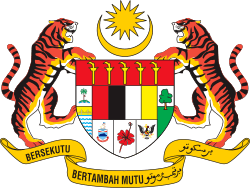United Sabah Party
United Sabah Party Parti Bersatu Sabah | |
|---|---|
 | |
| Abbreviation | PBS |
| President | Joseph Pairin Kitingan |
| Chairperson | Claudius Alex Sundang |
| Secretary-General | Johnny Juani Mositun |
| Deputy President |
Maximus Johnity Ongkili Yee Moh Chai Jamilah Sulaiman |
| Women Leader | Anita Lasiah Baranting |
| Acting Youth Leader | Christopher Mandut |
| Vice-President |
Radin Malleh Daniel Stanislaus Kinsik Thien Fui Yun Edward Yong Oui Fah Othman Minudin |
| Treasurer General | Linda Tsen |
| Founder | Joseph Pairin Kitingan |
| Founded | 5 March 1985 |
| Split from | Sabah People's United Front (opposition) |
| Headquarters |
Blok ‘M’, Lot 4, Tingkat 2 & 3, Donggongon New Township, Donggongon, 89507 Penampang (Peti Surat 13060, 88834 Kota Kinabalu, Sabah) |
| Youth wing | Youth Section |
| Women's wing | Women Section |
| Ideology |
Democracy Racial unity Kadazan-Dusun interests |
| National affiliation |
Gagasan Rakyat (1991–96) Barisan Nasional (1985–1990, 2002–2018) United Alliance (2018–) |
| Colours | Light blue and green |
| Dewan Negara: |
1 / 70 |
| Dewan Rakyat: |
1 / 222 |
| Sabah State Legislative Assembly: |
6 / 60 |
| Party flag | |
 | |
| Website | |
|
www | |
 |
|---|
| This article is part of a series on the politics and government of Malaysia |
|
The United Sabah Party (Malay: Parti Bersatu Sabah, abbreviated PBS) is a political party in Sabah, Malaysia. It was registered as a political party on 5 March 1985. The founding president was Tan Sri Datuk Seri Panglima Joseph Pairin Kitingan, who broke away from the ruling Parti Berjaya because of his differences with party president Tan Sri Datuk Seri Panglima Harris Salleh, the Chief Minister in whose cabinet Pairin served before the break.[1][2]
Although it is mainly seen as an ethnically-based Kadazan-Dusun political party, PBS calls itself a "Malaysian multi-racial political party"[3][4] in which members are mostly of Kadazan-Dusun (from both the Dusunic plus Paitanic ethnolinguistic groups) and Murut (including the Lundayeh subgroup) ethnic descent though the second and third largest ethnic membership are mostly Muslim Bumiputeras, mostly ethnic local Sabahan based ethnic Malay race (Bruneian Malays and Cocos Malays), and also from the Bajau community of peoples, which is the second-largest ethnic Bumiputra in the state including the Iranun subgroup and some Suluk together with the Chinese (alongside those of mixed-race or "Sino-Native" subgroup of the Chinese minority) and its declared political mission is to strive to safeguard Sabah's autonomy and states rights, promote democratic principles, economic advancement, human rights, and justice.[5]
PBS formed the state government after winning the 1985 state elections and governed Sabah from 1985 to 1994.[2] Following the 1986 Sabah riots,[1] PBS joined the Barisan Nasional (BN) coalition after winning the May 1986 state election.[6] However, on the eve of the July 1990 state election, PBS pulled out of the coalition[6] and won the state election for a third time. It also won the 1994 state elections by a narrow margin. However, numerous defections occurred as many PBS representatives switched allegiance to the then opposition BN coalition before PBS were even able to form a new state government. PBS subsequently rejoined the BN coalition in 2002, ending any form of opposition as BN fully occupied the state legislature and returning Sabah to the rule of the BN coalition that holds the federal parliament. Following the fall of BN in the 2018 general election, PBS leave the coalition and formed a new Sabah-based coalition of United Alliance (Gabungan Bersatu).[7]
Elected representatives
Dewan Negara (Senate)
Senators
- Appointed by His Majesty the Yang di-Pertuan Agong
- Jamilah Sulaiman
Dewan Rakyat (House of Representatives)
Members of Parliament of the 14th Malaysian Parliament
PBS currently only 1 MPs in the House of Representatives.
| State | No. | Parliament Constituency | Member | Party | ||
|---|---|---|---|---|---|---|
| P168 | Kota Marudu | Maximus Ongkili | PBS | |||
| Total | Sabah (1) | |||||
Dewan Undangan Negeri (State Legislative Assembly)
Malaysian State Assembly Representatives
Sabah State Legislative Assembly
Election results
| Election year | Malaysia Parliament | Sabah State Assembly | Outcome | ||
|---|---|---|---|---|---|
| Candidates | Seats won | Candidates | Seats won | ||
| 1985 | - | - | 45 | 25 / 48 |
New party Sabah state government |
| 1986 | - | - | 47 | 34 / 48 |
Sabah state government (snap election) |
| 1986 | 14 | 10 / 177 |
- | - | Part of Barisan Nasional federal government |
| 1990 | - | - | 48 | 36 / 48 |
BN Sabah state government, contested under PBS ticket |
| 1990 | 14 | 14 / 180 |
- | - | Federal opposition (left BN before polling day to join Gagasan Rakyat) |
| 1994 | - | - | 48 | 25 / 48 |
Sabah state government |
| 1995 | 28 | 8 / 192 |
- | - | Federal opposition |
| 1999 | - | - | 48 | 17 / 48 |
Sabah state opposition |
| 1999 | 17 | 3 / 193 |
- | - | Federal opposition |
| 2004 | 4 | 4 / 219 |
13 | 13 / 60 |
Part of Barisan Nasional federal government Part of BN Sabah state government |
| 2008 | 4 | 3 / 222 |
13 | 12 / 60 |
Part of Barisan Nasional federal government Part of BN Sabah state government |
| 2013 | 5 | 4 / 222 |
13 | 7 / 60 |
Part of Barisan Nasional federal government Part of BN Sabah state government |
| 2018 | 5 | 1 / 222 |
13 | 6 / 60 |
Part of Pakatan Harapan federal government Part of WARISAN Sabah state government |
References
- 1 2 Gan Pei Ling (14 September 2012). "The hushed riot of Sabah". Selangor Times. Retrieved 30 April 2018.
- 1 2 Mohd Hamdan Haji Adnan (2013). "Malaysia's 13th General Election in Sabah: Factors Determining the Winners" (PDF). Universiti Malaysia Sabah, Malaysian Journal of History, Politics & Strategic Studies. Universiti Kebangsaan Malaysia. pp. 96–97 [4–5/20]. ISSN 2180-0251. Retrieved 30 April 2018.
- ↑ "Resurgence of interest in multi-racial PBS". The Borneo Post. 2 October 2015. Retrieved 30 April 2018.
- ↑ Jason Santos (24 February 2018). "Multi-racial party not new in Sabah". The Malaysian Insight. Retrieved 30 April 2018.
- ↑ "PBS to strengthen multiracial identity". The Borneo Post. 7 March 2014. Retrieved 30 April 2018.
- 1 2 G. Lim. "Sabah: All Quiet On The Eastern Front?". Aliran Monthly. Archived from the original on 19 November 2007. Retrieved 20 January 2008.
- ↑ Kristy Inus (12 May 2018). "Sabah BN coalition to be disbanded to pave way for Gabungan Bersatu". New Straits Times. Retrieved 13 May 2018.
Notes
- James Chin. (1994) "Sabah State Election of 1994: End of Kadazan Unity, Asian Survey, Vol. 34, No. 10, pp. 904–915.